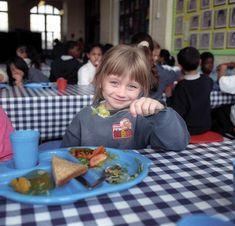
The 20 percent decline in school meal take-up reported by the Local Authorities Catering Association this week is not an excuse to slide back to the bad old days of turkey twizzlers and chips, the Soil Association has warned.
Instead, it says it should prompt a new focus on practical food education and sourcing local and organic food
The SA claims that its new £17 million Lottery-funded Food for Life Partnership, led by the association, is confident that it can lead the way in reversing the downward trend in school meal take-up by revolutionising food sourcing and wiping out food illiteracy in five years. Cooking skills champion Focus on Food Campaign, Garden Organic and the Health Education Trust are joining forces in the new Partnership.
In Food for Life school of the year 2007, Millfields Community School in Hackney, take-up has risen by 40 percent following a switch to 50 percent local and 40 percent organic ingredients and a programme of farm visits. This is despite being in a socially-deprived area where 20 percent of children are from asylum-seeker families.
Take-up of school meals has risen in hundreds of schools that have signed up to the Soil Association’s Food for Life target, the association pointed out.
180 Food for Life Flagship Schools will demonstrate that giving children hands-on experience of growing and cooking their own food and visiting local and organic farms will increase their appetite for fresh healthy fruit and veg, and boost school meals uptake. Flagship schools will also reach out to parents and community groups to get them cooking and growing food too.
Joanna Collins, Food for Life Partnership Policy Manager said: “With obesity at record levels, a surrender to bad food habits to rescue school meal take-up is not an option. Luckily there is good evidence that pupils and parents quickly wise up to the value of healthy meals if they are involved in planning menu changes and able to visit local farms that supply food to the school.
“And there is no better way of getting children eating fruit and vegetables than helping them to grow their own in school gardens and cook with that food. Every school, urban or rural, can grow seasonal organic produce for cooking lessons and school dinners, and Food for Life flagship schools will be demonstrating how.”
Famous dinner lady Jeanette Orrey advises the Partnership. Her pioneering work as a dinner lady at St Peter’s Primary, near Nottingham, inspired Jamie Oliver back in 2003.



